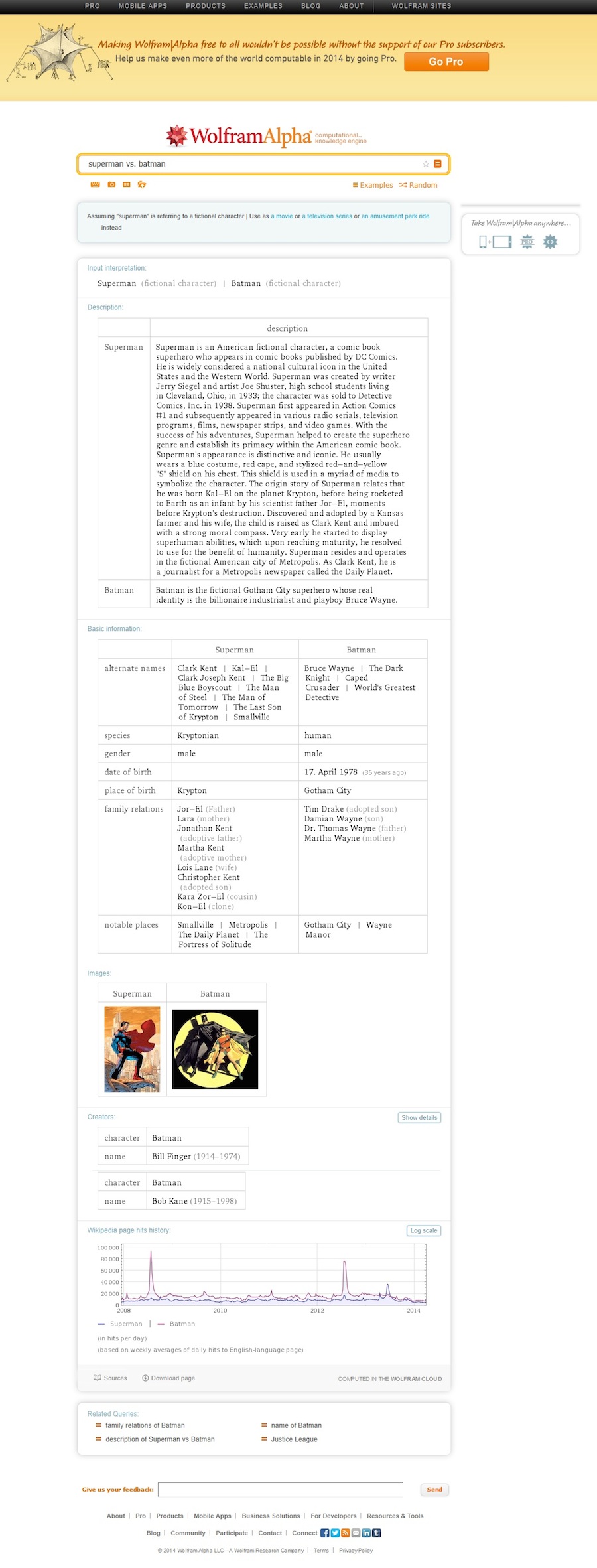Wolfram Alpha
Wolfram Alpha is a semantic search engine that was invented by Stephen Wolfram and has been continuously developed since 2005. Unlike Google search, the goal of a search on Wolfram Alpha is not a list of hyperlinks in which user find answers to their requests, but a compilation of facts as specific results, similar to Google’s KnowledgeGraph, which was further developed with the Hummingbird Update. The search engine Wolfram Alpha has been able to handle specific questions since its launch and is thus a pioneer of the semantic search.
Background and History
Wolfram Alpha defines itself as a “computational knowledge engine,” a computer-based knowledge machine. The answer to the alignment is already given. This semantic search engine wants to provide specific results on queries since 2005. In order to provide these answers, Wolfram Alpha does not work like a conventional search engine with a crawler and an index that creates hyperlinks with snippets. Instead, the system provides complete lists and tables to provide users with specific answers to their questions. The approach is therefore a scientific one. Thus, Wolfram Alpha excludes users with purchase intentions per se.
The search engine is based on the Mathematica software, developed and advanced by Stephen Wolfram and more than 100 employees, with which computation operations can be carried out.
Wolfram Alpha was launched in 2009 and was met with a lot of media coverage. Questions arose as to whether this search engine will really be a “Google killer” because of its new results format.[1].
Since 2009 Wolfram Alpha is available as an app for Android and iOS devices.
Features
The search engine offers its users numerous special functions, which will be listed here briefly:
Calculations
Simple and even more complex calculations can be carried out with Wolfram Alpha. The search engine calculates matrices, is capable in algebra, has a command of trigonometry, and can also use number theories. In addition, Wolfram Alpha can also handle chemical formulas and physical calculations. Moreover, the search engine solves finances and related computing operations.
Information on nutritional values of food
If you enter the name of a food into the Wolfram Alpha search, you will get the corresponding nutritional values in the form of tables and graphics as a result. Example: fat free milk
Wolfram Alpha search results in table format for the example “fat free milk”
Calculation of orbits
Conversion of units of measure and time differences
The semantic search engine can convert dimensions or display different time zones.
Information
Wolfram Alpha provides structured results on educational institutions, sociodemographic data, materials, culture and media, as well as geographical facts and institutions.
Search results from Wolfram Alpha are also displayed by the search engine DuckDuckGo.
Evaluation of Facebook profiles
Wolfram Alpha offers something special with this function. Because this feature allows users to analyze their own Facebook profile in terms of reach, links to other users or Likes. The evaluation of Facebook profiles can also be called “Personal Analytics.”
Comparisons
The search engines offer the option to compare different aspects, persons, countries or issues.
Wolfram Alpha search example “superman vs. batman”
Image analysis
Users can also upload images and have them analyzed by Wolfram Alpha.
File analysis
Similar to images, the search engine can also be used to analyze files.
All areas covered by Wolfram Alpha can be found here with separate examples at Wolframapha.com.
Benefits for SEO
Wolfram Alpha is not a conventional search engine, since it is primarily intended to provide knowledge. It will therefore hardly have any importance for E-Commerce and consequently just as little for the majority of search engine optimizers. Since the search results of Wolfram Alpha do not consist of links pointing to a specific website, this search engine cannot serve as a traffic supplier. Instead, it shows the particular way in which semantic searches can be interpreted and how powerful such a search can be currently.
As the leading search engine on the market, Google has shown since the Hummingbird Update that it can also deal with semantic search queries. However, unlike Wolfram Alpha, Google’s main focus is on making money through search engine advertising Google AdWords. User behavior will therefore continue to influences Google’s search result lists. Nevertheless, SEOs and users have to adapt to the fact that Google is no longer the only search engine on the web, but also makes enormous advances in the field of knowledge acquisition and can exploit its market power. First results were visible after the Hummingbird update.
Interestingly, Google also indexes search queries from Wolfram Alpha. The extent to which this is intended to increase its own knowledge base remains a speculation.
References
- ↑ Wolfram Alpha: a Google killer radar.oreilly.com Accessed on 04/12/2014


